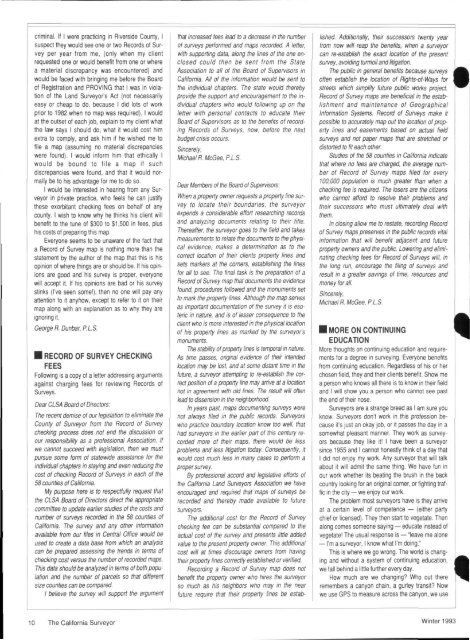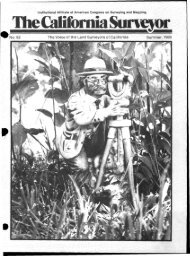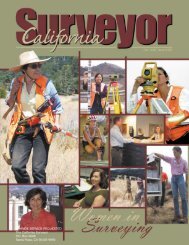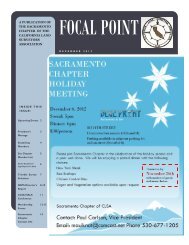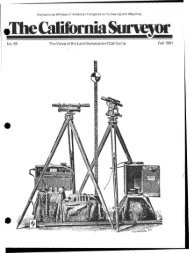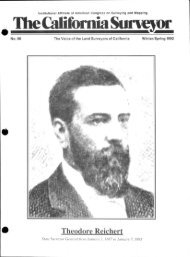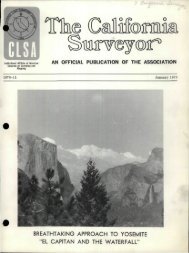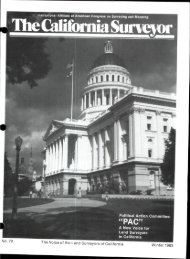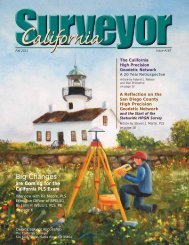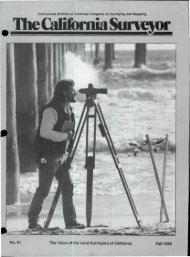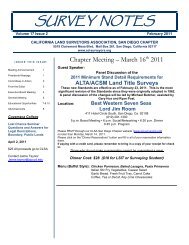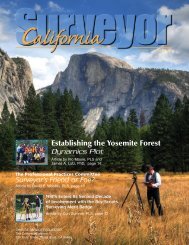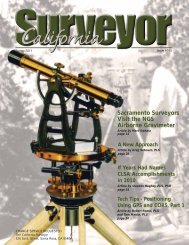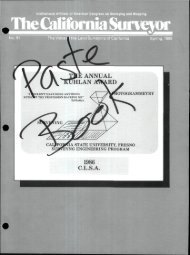t The California Surveyor - CLSA
t The California Surveyor - CLSA
t The California Surveyor - CLSA
You also want an ePaper? Increase the reach of your titles
YUMPU automatically turns print PDFs into web optimized ePapers that Google loves.
I<br />
I<br />
I<br />
I<br />
criminal. If I were practicing in Riverside County, I<br />
suspect they would see one or two Records of Survey<br />
per year from me, (only when my client<br />
requested one or would benefit from one or where<br />
a material discrepancy was encountered) and<br />
would be faced with bringing me before the Board<br />
of Registration and PROVING that I was in violation<br />
of the Land <strong>Surveyor</strong>'s Act (not necessarily<br />
easy or cheap to do, because I did lots of work<br />
prior to 1982 when no map was required). I would<br />
at the outset of each job, explain to my client what<br />
the law says I should do, what it would cost him<br />
extra to comply, and ask him if he wished me to<br />
file a map (assuming no material discrepancies<br />
were found). I would inform him that ethically I<br />
would be bound to file a map if such<br />
discrepancies were found, and that it would normally<br />
be to his advantage for me to do so.<br />
I would be interested in hearing from any <strong>Surveyor</strong><br />
in private practice, who feels he can justify<br />
these exorbitant checking fees on behalf of any<br />
county. I wish to know why he thinks his client will<br />
benefit to the tune of $300 to $1,500 in fees, plus<br />
his costs of preparing this map.<br />
Everyone seems to be unaware of the fact that<br />
a Record of Survey map is nothing more than the<br />
statement by the author of the map that this is his<br />
opinion of where things are or should be. If his opinions<br />
are good and his survey is proper, everyone<br />
will accept it. If his opinions are bad or his survey<br />
stinks (I've seen some!), then no one will pay any<br />
attention to it anyhow, except to refer to it on their<br />
map along with an explanation as to why they are<br />
ignoring it.<br />
George R. Dunbar, P.L.S.<br />
• RECORD OF SURVEY CHECKING<br />
FEES<br />
Following is a copy of a letter addressing arguments<br />
against charging fees for reviewing Records of<br />
Surveys.<br />
Dear <strong>CLSA</strong> Board of Directors:<br />
<strong>The</strong> recent demise of our legislation to eliminate the<br />
County of <strong>Surveyor</strong> from the Record of Survey<br />
checking process does not end the discussion or<br />
our responsibility as a professional Association. If<br />
we cannot succeed with legislation, then we must<br />
pursue some form of statewide assistance for the<br />
individual chapters in staying and even reducing the<br />
cost of checking Record of Surveys in each of the<br />
58 counties of <strong>California</strong>.<br />
My purpose here is to respectfully request that<br />
the <strong>CLSA</strong> Board of Directors direct the appropriate<br />
committee to update earlier studies of the costs and<br />
number of surveys recorded in the 58 counties of<br />
<strong>California</strong>. <strong>The</strong> survey and any other information<br />
available from our files in Central Office would be<br />
used to create a data base from which an analysis<br />
can be prepared assessing the trends in terms of<br />
checking cost versus the number of recorded maps.<br />
This data should be analyzed in terms of both population<br />
and the number of parcels so that different<br />
; size counties can be compared.<br />
I believe the survey will support the argument<br />
that increased fees lead to a decrease in the number<br />
of surveys performed and maps recorded. A letter,<br />
with supporting data, along the lines of the one enclosed<br />
could then be sent from the State<br />
Association to all of the Board of Supervisors in<br />
<strong>California</strong>. All of the information would be sent to<br />
the individual chapters. <strong>The</strong> state would thereby<br />
provide the support and encouragement to the individual<br />
chapters who would following up on the<br />
letter with personal contacts to educate their<br />
Board of Supervisors as to the benefits of recording<br />
Records of Surveys, now, before the next<br />
budget crisis occurs.<br />
Sincerely,<br />
Michael R. McGee, P.L.S.<br />
Dear Members of the Board of Supervisors:<br />
When a property owner requests a property line survey<br />
to locate their boundaries, the surveyor<br />
expends a considerable effort researching records<br />
and analyzing documents relating to their title.<br />
<strong>The</strong>reafter, the surveyor goes to the field and takes<br />
measurements to relate the documents to the physical<br />
evidence, makes a determination as to the<br />
correct location of their clients property lines and<br />
sets markers at the corners, establishing the lines<br />
for all to see. <strong>The</strong> final task is the preparation of a<br />
Record of Survey map that documents the evidence<br />
found, procedures followed and the monuments set<br />
to mark the property lines. Although the map serves<br />
as important documentation of the survey it is esoteric<br />
in nature, and is of lesser consequence to the<br />
client who is more interested in the physical location<br />
of his property lines as marked by the surveyor's<br />
monuments.<br />
<strong>The</strong> stability of property lines is temporal in nature.<br />
As time passes, original evidence of their intended<br />
location may be lost, and at some distant time in the<br />
future, a surveyor attempting to re-establish the correct<br />
position of a property line may arrive at a location<br />
not in agreement with old lines. <strong>The</strong> result will often<br />
lead to dissension in the neighborhood.<br />
In years past, maps documenting surveys were<br />
not always filed in the public records. <strong>Surveyor</strong>s<br />
who practice boundary location know too well, that<br />
had surveyors in the earlier part of this century recorded<br />
more of their maps, there would be less<br />
problems and less litigation today. Consequently, it<br />
would cost much less in many cases to perform a<br />
proper survey.<br />
By professional accord and legislative efforts of<br />
the <strong>California</strong> Land <strong>Surveyor</strong>s Association we have<br />
encouraged and required that maps of surveys be<br />
recorded and thereby made available to future<br />
surveyors.<br />
<strong>The</strong> additional cost for the Record of Survey<br />
checking fee can be substantial compared to the<br />
actual cost of the survey and presents little added<br />
value to the present property owner. This additional<br />
cost will at times discourage owners from having<br />
their property lines correctly established or verified.<br />
Recording a Record of Survey map does not<br />
benefit the property owner who hires the surveyor<br />
so much as his neighbors who may in the near<br />
future require that their property lines be established<br />
Additionally, their successors twenty year<br />
from now will reap the benefits, when a surveyor<br />
can re-establish the exact location of the present<br />
survey, avoiding turmoil and litigation.<br />
<strong>The</strong> public in general benefits because surveys<br />
often establish the location of Rights-of-Ways for<br />
streets which simplify future public works project.<br />
Record of Survey maps are beneficial in the establishment<br />
and maintenance of Geographical<br />
Information Systems. Record of Surveys make it<br />
possible to accurately map out the location of property<br />
lines and easements based on actual field<br />
surveys and not paper maps that are stretched or<br />
distorted to fit each other.<br />
Studies of the 58 counties in <strong>California</strong> indicate<br />
that where no fees are charged, the average number<br />
of Record of Survey maps filed for every<br />
100,000 population is much greater than when a<br />
checking fee is required. <strong>The</strong> losers are the citizens<br />
who cannot afford to resolve their problems and<br />
their successors who must ultimately deal with<br />
them.<br />
In closing allow me to restate, recording Record<br />
of Survey maps preserves in the public records vital<br />
information that will benefit adjacent and future<br />
property owners and the public. Lowering and eliminating<br />
checking fees for Record of Surveys will, in<br />
the long run, encourage the filing of surveys and<br />
result in a greater savings of time, resources and<br />
money for all.<br />
Sincerely,<br />
Michael R. McGee, P.L.S.<br />
• MORE ON CONTINUING<br />
EDUCATION<br />
More thoughts on continuing education and requirements<br />
for a degree in surveying. Everyone benefits<br />
from continuing education. Regardless of his or her<br />
chosen field, they and their clients benefit. Show me<br />
a person who knows all there is to know in their field<br />
and I will show you a person who cannot see past<br />
the end of their nose.<br />
<strong>Surveyor</strong>s are a strange breed as I am sure you<br />
know. <strong>Surveyor</strong>s don't work in this profession because<br />
it's just an okay job, or it passes the day in a<br />
somewhat pleasant manner. <strong>The</strong>y work as surveyors<br />
because they like it! I have been a surveyor<br />
since 1955 and I cannot honestly think of a day that<br />
I did not enjoy my work. Any surveyor that will talk<br />
about it will admit the same thing. We have fun in<br />
our work whether its beating the brush in the back<br />
country looking for an original corner, or fighting traffic<br />
in the city — we enjoy our work.<br />
<strong>The</strong> problem most surveyors have is they arrive<br />
at a certain level of competence — (either party<br />
chief or licensed). <strong>The</strong>y then start to vegetate. <strong>The</strong>n<br />
along comes someone saying — educate instead of<br />
vegetate! <strong>The</strong> usual response is — "leave me alone<br />
— I'm a surveyor, I know what I'm doing."<br />
This is where we go wrong. <strong>The</strong> world is changing<br />
and without a system of continuing education,<br />
we fall behind a little further every day.<br />
How much are we changing? Who out there<br />
remembers a canyon chain, a gurley transit? Now<br />
we use GPS to measure across the canyon, we use<br />
10 <strong>The</strong> <strong>California</strong> <strong>Surveyor</strong> Winter 1993


